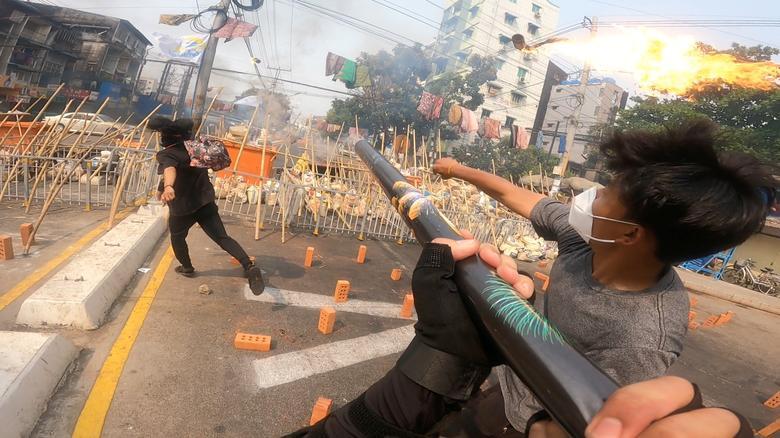Japan’s Toyota Motor Corp said on Wednesday it has begun building cars at its new plant in Myanmar after the site was put on hold during the country’s military coup.
Toyota said the plant is assembling around two Hilux trucks per day, using parts delivered to Myanmar in September.
The move is contentious, as dozens of other foreign firms have pulled out of business in Myanmar since the coup in February last year, due to public pressure because of concern that their business would benefit the ruling military.
“We believe this meets our initial intention to contribute to the industrial development of Myanmar … and to support our employees and their families’ lives,” Toyota said in a statement.
“Under these circumstances, we are continuously making every effort to comply with all relevant laws and regulations.”
Also on AF: South Korean Chip Giants Seen Avoiding US Export Curbs
Myanmar’s Coup
The plant had originally been due to open in February 2021, the same month that the military seized power to stop former leader Aung San Suu Kyi’s National League for Democracy forming a new government.
Human Rights Watch, a leading advocacy group, called for Toyota and any other companies seeking to invest or resume operation in Myanmar to conduct human rights due diligence.
“Toyota should certainly refrain from doing business with Myanmar military owned conglomerates … as well as their subsidiaries,” Teppei Kasai, an Asia programme officer with the group.
At least 2,343 people, including nearly 300 children, have been killed by regime troops and more than 15,821 people have been arrested, while 12,623 remain in detention, according to the Assistance Association for Political Prisoners, which has monitored arrests and verified killings since the coup.
More than 700 are believed to have been killed after being arrested, including four democracy activists who were executed in July.
Singapore Firms Brokered Arms Deals: JFM
In related news, the Justice For Myanmar group says more than 100 Myanmar and Singapore companies have brokered deals to supply weapons and other equipment worth many millions of US dollars to the Myanmar military.
“The suppliers of arms to the Myanmar military have had knowledge of the war crimes, crimes against humanity and genocide committed by the brutal military,” it said in a recent report. “Those who continue to provide arms are complicit in the military’s atrocity crimes.
The group said military had “carried out indiscriminate airstrikes and shelling, murdered villagers, committed rape, destroyed homes and crops, and forcibly displaced close to a million people in the northwest, southeast and other areas.
- Reuters, with additional editing from Alfie Habershon and Jim Pollard
Read more:
Toyota Restarts Production of First EV After Fixing Bolt Concern
Myanmar Sets Up China-Made CCTVs in More Cities
Myanmar-China Traders Battered by Forex Rates, New Rules
Crime Gangs Control Some Myanmar, Laos Economic Zones: UN
Singapore urged to freeze accounts holding Myanmar reserves
























